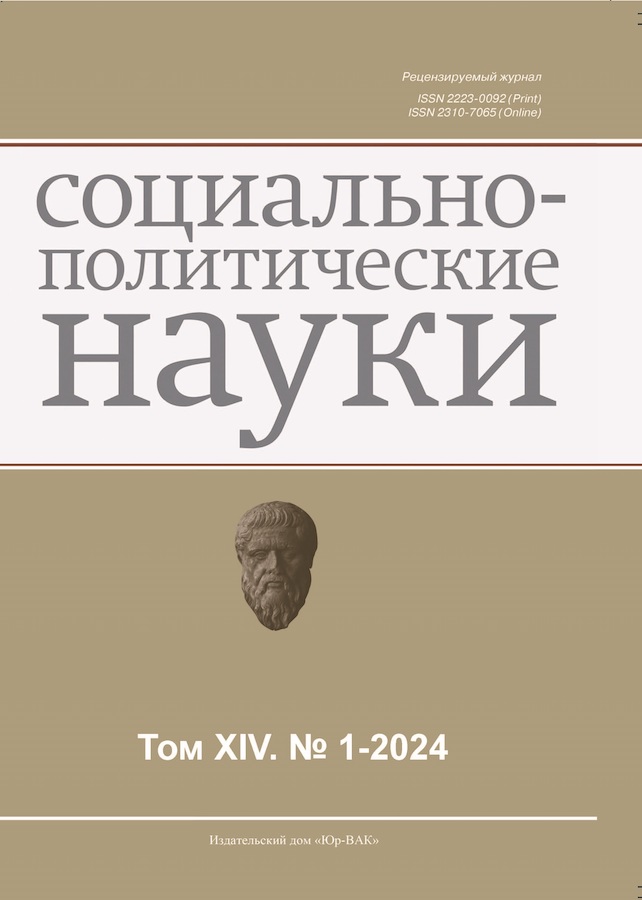Features of the Russian “soft power” at the present stage of development
- Authors: Kerimov A.A.1, Aleshchenko P.S.1
-
Affiliations:
- Ural Federal University named after the first President of Russia B.N. Yeltsin
- Issue: Vol 14, No 1 (2024)
- Pages: 19-23
- Section: Political Institutions, Processes and Technologies
- URL: https://journals.eco-vector.com/2223-0092/article/view/630524
- DOI: https://doi.org/10.33693/2223-0092-2024-14-1-19-23
- EDN: https://elibrary.ru/CBEPBF
- ID: 630524
Cite item
Abstract
The article examines the features and characteristics of the Russian “soft power”, as well as its role and influence on international politics and relations with other states. The article also analyzes practical examples of the use of Russian “soft power”, such as diplomacy, cultural programs, education and science, economic cooperation and information influence. Special attention is paid to changes in Russia’s approach to “soft power” at the current stage of development, including the use of digital technologies. In conclusion, the authors draw conclusions about the importance of Russian “soft power” in the modern international arena and suggest ways to improve policy in this direction. The article uses both general scientific and socio-humanitarian methods of scientific cognition. The results of the study can be in demand by both representatives of the expert community, as well as teachers, graduate students, and students when studying the problems of Russia’s use of “soft power”.
Full Text
About the authors
Alexander A. Kerimov
Ural Federal University named after the first President of Russia B.N. Yeltsin
Author for correspondence.
Email: kerimov68@mail.ru
ORCID iD: 0000-0002-5807-9810
SPIN-code: 8591-7561
Scopus Author ID: 57215904379;
ResearcherId: AAG-9905-2019
Dr. Sci. (Polit.), Associate Professor; Professor, Department of Political Sciences
Russian Federation, YekaterinburgPavel S. Aleshchenko
Ural Federal University named after the first President of Russia B.N. Yeltsin
Email: aspavel87@mail.ru
ORCID iD: 0009-0002-4157-0731
candidate, Department of Political Sciences
Russian Federation, YekaterinburgReferences
- Ageeva A.V. The role of “soft power” instruments in Russia’s foreign policy. Vlast. 2018. No. 4. Pp. 59–63. (In Rus.)
- Bakov A.A., Kerimov A.A. Regions in international activity: Factors of development of paradiplomacy. Discourse-Pi. 2018. No. 3–4 (32–33). Pp. 164–172. (In Rus.)
- Budaev A.V. “Soft power” in Russian foreign policy: Origins, features, prospects. Public Administration. Electronic Bulletin. 2015. Issue 48. (In Rus.)
- Didenko D.V. Statistics of financing of Russian education and science: As evidenced by historical data. Finance and Credit. 2013. No. 34 (562). Pp. 71–80. (In Rus.)
- Isakov A.S. Conceptual evolution of public administration: A heuristic experiment. In: State, politics, society: Challenges and strategic priorities of development. Change management: Mozaika senariev in the Government of Turkey: Proceedings of the XV International Scientific and Practical Conference (Yekaterinburg, November 27–28, 2019). In 3 vols. Vol. 1. Yekaterinburg, 2019. Pp. 400–405.
- Lebedeva M.M. Soft Power: The concept and approaches. Bulletin of MGIMO University. 2017. No. 3 (54). Pp. 212–223. (In Rus.)
- Lukin A.V. Russia’s turn towards Asia: Myth or reality? International Life. 2016. No. 4. Pp. 90–107. (In Rus.)
- Nye J. The future of power. New York, Public Affairs, 2011. 300 p.
- Gallarotti G.M. Soft power: What it is, why it’s important, and the conditions under which it can be effectively used. Journal of Political Power. 2011. Pp. 25–47.
Supplementary files









